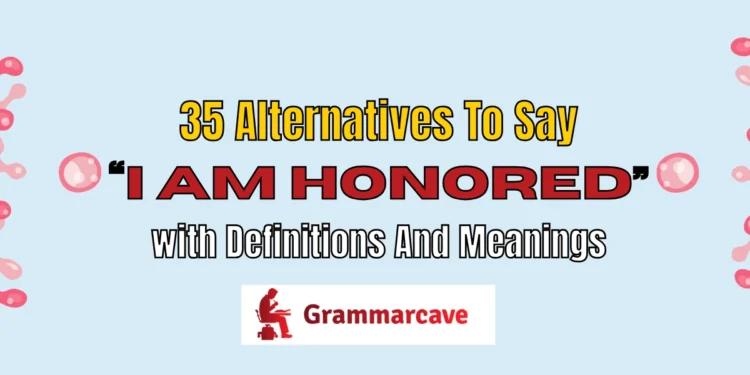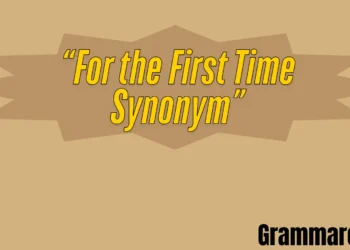Expressing gratitude and modesty in a professional or formal setting is critical. The expression “I am honored” is one of the classic ways in which every one of us uses to show appreciation for recognition, praise, or opportunities that are given to us as responsibility. Constant usage makes expressions feel repetitive or less impactful. Tailoring your words not only enhances expression but also helps customise the message as per the context and audience being addressed.
In this guide, we will talk about understanding the quote “I am honored,” its pros and cons, and 35 expressions you can use in its place. Each of these alternatives comes with a definition, meaning, explanation, example, best and worst use, and tone so that one can decide what to say in any situation.
What Does “I Am Honored” Mean?
Gratitude is expressed particularly well through receiving recognition and with an opportunity. The responsibility placed on an individual draws strong appreciation towards their trust and acknowledgement given through words.
Is “I Am Honored” Polite and Professional?
“I Am Honored” is highly used in formal communications such as acceptance speeches and professional emails. The word itself bears tremendous responsibility and expresses great respect, thus allowing the user of the word to gain a reciprocating sense of respect towards the peers and colleagues and all other groups of people bound by professional relations.
Advantages and Disadvantages of Using “I Am Honored”
Advantages:
- Respectful Tone: Carry humility and appreciation.
- Professionalism: Appropriate for formal settings and communications.
- Clarity: Clearly expresses gratitude and recognition.
Disadvantages:
- Overuse: Frequent use may diminish its impact.
- Lack of Personalisation: May come across as generic if not tailored to the particular context.
- Formality: Might be too formal for casual or informal conditions.
35 different alternatives and their explanations

01. I’m pleased to be recognised
- Definition: Expressing satisfaction at being acknowledged.
- Meaning: You acknowledge the honour with professional composure.
- Explanation: Balanced and modest for workplace or academic settings.
- Example: I’m pleased to be recognised for our team’s contributions.
- Best use: Employee awards, formal reviews.
- Worst use: Highly emotional or personal settings.
- Tone: Professional, neutral.
02. I respectfully accept this recognition
- Definition: Receiving acknowledgement with formal courtesy.
- Meaning: Shows professionalism and humility.
- Explanation: Ideal for ceremonies, awards, and formal communication.
- Example: I respectfully accept this recognition on behalf of the department.
- Best use: Corporate or institutional events.
- Worst use: Informal or lighthearted settings.
- Tone: Formal, composed.
03. I appreciate the professional confidence placed in me
- Definition: Expressing gratitude for being trusted professionally.
- Meaning: Highlights trust and respect in professional settings.
- Explanation: Good when stepping into a new responsibility or role.
- Example: I appreciate the professional confidence placed in me.
- Best use: Leadership appointments, promotions.
- Worst use: Artistic or emotional awards.
- Tone: Formal, confident.
04. I value this recognition greatly
- Definition: Placing high professional importance on being acknowledged.
- Meaning: Signals genuine appreciation without emotional overtones.
- Explanation: Clear and concise for written communication.
- Example: I value this recognition greatly and remain committed to excellence.
- Best use: Written statements, press releases.
- Worst use: Jokes or casual awards.
- Tone: Professional, sincere.
05. I appreciate this professional distinction
- Definition: Grateful for a status that sets you apart in your field.
- Meaning: Acknowledges value without emotional overstatement.
- Explanation: Best for awards or certifications.
- Example: I appreciate this professional distinction and the support of my colleagues.
- Best use: Certifications, publications, and award acceptances.
- Worst use: Light or informal events.
- Tone: Formal, polished.
06. I accept this acknowledgement with professional humility
- Definition: Receiving praise modestly while affirming professionalism.
- Meaning: Avoids self-congratulation but still accepts with grace.
- Explanation: Useful in high-stakes, visible roles.
- Example: I accept this acknowledgement with professional humility and dedication.
- Best use: Public or internal leadership recognition.
- Worst use: Informal or private contexts.
- Tone: Formal, self-aware.
07. I’m pleased to accept
- Definition: Gladly receiving something.
- Meaning: Shows appreciation with polite professionalism.
- Explanation: Balanced between formal and friendly.
- Example: I’m pleased to accept this responsibility.
- Best use: Professional settings, invitations.
- Worst use: Emotional or deeply personal recognitions.
- Tone: Polite, professional.
08. This means the world to me
- Definition: Emotionally very important to you.
- Meaning: You deeply value the gesture.
- Explanation: Strong, personal appreciation.
- Example: This means the world to me—thank you.
- Best use: Close-knit groups, heartfelt moments.
- Worst use: Corporate announcements.
- Tone: Emotional, intimate.
09. I take this as a great compliment
- Definition: Interpreting the gesture as a positive acknowledgement.
- Meaning: You are proud of being chosen or praised.
- Explanation: Slightly more reserved than “honored.”
- Example: I take this as a great compliment to my team’s effort.
- Best use: Informal recognition or compliments.
- Worst use: Major public ceremonies.
- Tone: Humble, polite.
10. I feel sincerely validated
- Definition: Feeling affirmed or acknowledged authentically.
- Meaning: Your efforts feel recognised and respected.
- Explanation: Often used in creative or personal development settings.
- Example: I feel sincerely validated by this recognition.
- Best use: Arts, personal development, and therapy contexts.
- Worst use: Formal business meetings.
- Tone: Reflective, affirming.
11. It’s a great moment in my journey
- Definition: Significant milestone in your personal/professional path.
- Meaning: The recognition contributes to your ongoing growth.
- Explanation: Good for storytelling tone.
- Example: This is a great moment in my journey—thank you.
- Best use: Speeches, memoir-style reflection.
- Worst use: Formal military or government recognition.
- Tone: Motivating, Dignified.
12. I welcome this acknowledgement with professionalism
- Definition: Accepting praise with appropriate formality.
- Meaning: You are measured and composed in your response.
- Explanation: Signals maturity and reliability.
- Example: I welcome this acknowledgement with professionalism and continued commitment.
- Best use: Formal presentations, career milestones.
- Worst use: Overly emotional or artistic events.
- Tone: Polished, composed.
13. I feel grateful
- Definition: Expressing thankfulness.
- Meaning: You recognise and value the gesture.
- Explanation: A general expression of thanks, less formal than “honored.”
- Example: I feel grateful to be part of this project.
- Best use: Team settings.
- Worst use: Formal ceremonies.
- Tone: Formal, warm.
14. This recognition reflects the efforts of many
- Definition: Giving credit to a team or shared effort.
- Meaning: Accepting honour while emphasising collaboration.
- Example: This recognition reflects the efforts of many dedicated individuals.
- Best use: Team awards, leadership roles.
- Worst use: solo achievements with no collaboration.
- Tone: Sincere, leadership.
15. I’m proud
- Definition: Feeling personal satisfaction.
- Meaning: Shows confidence in oneself or one’s team.
- Explanation: Often used to express earned success.
- Example: I’m proud to represent my department today.
- Best use: Performance reviews, promotions.
- Worst use: Accepting help or sympathy.
- Tone: Strong, Grateful.
16. I feel respected
- Definition: Feeling acknowledged or valued.
- Meaning: Recognition has affirmed your value.
- Explanation: Personal and reflective.
- Example: I feel respected to be considered for this role.
- Best use: When moving up in a professional environment.
- Worst use: With humour or sarcasm.
- Tone: Natural, warm.
17. It means a lot to me
- Definition: It carries emotional or personal significance.
- Meaning: You truly value the gesture of recognition.
- Explanation: Less formal but very personal.
- Example: This award means a lot to me.
- Best use: In sincere, intimate moments.
- Worst use: In formal acceptance speeches.
- Tone: Heartfelt, conversational.
18. I accept with gratitude
- Definition: Willingly and appreciatively receiving something.
- Meaning: A formal but heartfelt acceptance.
- Explanation: Best when taking on responsibility or gifts.
- Example: I accept with gratitude this new role.
- Best use: Formal ceremonies, job offers.
- Worst use: Joking or sarcastic replies.
- Tone: Grateful, composed.
19. I appreciate this moment of recognition
- Definition: Thankful for being acknowledged at a specific time.
- Meaning: You view the recognition as timely and meaningful.
- Explanation: Good for concise but professional responses.
- Example: I appreciate this moment of recognition and share it with my team.
- Best use: Speeches, professional communication.
- Worst use: Repeated use in casual contexts.
- Tone: Courteous, professional.
20. I’m truly appreciative
- Definition: Genuinely thankful.
- Meaning: Honest and unexaggerated gratitude.
- Explanation: Balanced tone for both formal and informal use.
- Example: I’m truly appreciative of this chance to contribute.
- Best use: Workplace acknowledgements.
- Worst use: Large ceremonies.
- Tone: Neutral, genuine.
21. I’m grateful beyond words
- Definition: So thankful that words aren’t enough.
- Meaning: Deep emotional appreciation.
- Explanation: Used for dramatic or heartfelt thanks.
- Example: I’m grateful beyond words for your belief in me.
- Best use: Sentimental moments.
- Worst use: Formal technical discussions.
- Tone: Emotional, sincere.
22. I appreciate this greatly
- Definition: Expressing high levels of gratitude.
- Meaning: You truly recognise the gesture.
- Explanation: Straightforward and clear.
- Example: I appreciate this greatly—thank you for the opportunity.
- Best use: work emails, thank-you notes.
- Worst use: Overly dramatic occasions.
- Tone: Respectful, grounded.
23. I deeply appreciate it
- Definition: Expressing strong gratitude.
- Meaning: You value what has been done or given.
- Explanation: Suitable for formal yet personal acknowledgement.
- Example: I deeply appreciate your trust in me.
- Best use: When acknowledging someone’s support or selection.
- Worst use: In very casual interactions.
- Tone: Warm, formal.
24. This recognition means everything
- Definition: This acknowledgement is deeply important.
- Meaning: It highlights the emotional or personal weight of recognition.
- Explanation: Powerful when recognition is long-awaited.
- Example: This recognition means everything to me.
- Best use: Lifetime or career awards.
- Worst use: Every day compliments.
- Tone: Emotional, serious.
25. I’m truly moved
- Definition: Emotionally touched by a gesture or recognition.
- Meaning: The moment affects you deeply.
- Explanation: Ideal for heartfelt gratitude.
- Example: I’m truly moved by your support.
- Best use: Retirement, tributes, memorials.
- Worst use: Business partnerships.
- Tone: Heartfelt, emotional.
26. I accept with humility
- Definition: Receiving something modestly and gratefully.
- Meaning: You don’t boast but still accept gratefully.
- Explanation: A humble tone that avoids arrogance.
- Example: I accept with humility and gratitude.
- Best use: Award speeches, leadership roles.
- Worst use: Casual thanks.
- Tone: Humble, respectful.
27. I’m honoured beyond words
- Definition: Too moved to express with speech.
- Meaning: Extreme appreciation.
- Explanation: Emphasises how deeply you feel the honour.
- Example: I’m honoured beyond words to be part of this legacy.
- Best use: Major recognitions.
- Worst use: Casual announcements.
- Tone: Profound, emotional.
28. I cherish this moment
- Definition: You deeply value the occasion.
- Meaning: The experience has personal meaning.
- Explanation: Suitable when something feels emotionally significant.
- Example: I truly cherish this moment with all of you.
- Best use: Sentimental occasions, family, or personal milestones.
- Worst use: Business contexts.
- Tone: Emotional, warm.
29. Thank you for this distinction
- Definition: Grateful for being recognised above others.
- Meaning: Recognises the special nature of the honour.
- Explanation: Emphasises exclusivity.
- Example: Thank you for this distinction and recognition.
- Best use: Competitive awards, honours.
- Worst use: Group settings without comparison.
- Tone: Formal, appreciative.
30. It’s a great distinction
- Definition: A significant and special recognition.
- Meaning: You feel set apart positively.
- Explanation: Polished and professional phrasing.
- Example: It’s a great distinction to receive this medal.
- Best use: Ceremonies or professional acknowledgements.
- Worst use: Informal interviews.
- Tone: High-level, formal, polished.
31. It’s truly a high point for me
- Definition: A peak experience in your journey.
- Meaning: You place great personal value on the honour.
- Explanation: Good for summing up a career milestone.
- Example: It’s truly a high point for me in my career.
- Best use: Retirements, lifetime awards.
- Worst use: Small achievements.
- Tone: Reflective, dignified.
32. I feel deeply recognised
- Definition: You sense sincere acknowledgement.
- Meaning: The honour affirms your identity or work.
- Explanation: Often used after long effort or underappreciation.
- Example: I feel deeply recognised by this honour.
- Best use: When acknowledgement was long overdue.
- Worst use: Flippant or humorous remarks.
- Tone: Thoughtful, validating.
33. I gladly accept this role
- Definition: Willingly taking on a responsibility.
- Meaning: You are enthusiastic and grateful.
- Explanation: Professional and proactive.
- Example: I gladly accept this role and the challenges ahead.
- Best use: New jobs, leadership roles.
- Worst use: Emotional recognition.
- Tone: Confident, respectful.
34. It fills me with gratitude
- Definition: You are overcome with appreciation.
- Meaning: Emotionally rich expression.
- Explanation: Suggests the gesture was heartfelt.
- Example: It fills me with gratitude to receive this kind gesture.
- Best use: Emotional acknowledgements.
- Worst use: Casual business notes.
- Tone: Emotional, personal.
35. I acknowledge this recognition with gratitude
- Definition: Receiving recognition formally and appreciatively.
- Meaning: Balances formality and sincerity.
- Explanation: Best in written statements or formal emails.
- Example: I acknowledge this recognition with gratitude and responsibility.
- Best use: Academic and government settings.
- Worst use: social settings or direct messages.
- Tone: Professional, respectful.
Conclusion
Navigating phrases of appreciation and acknowledgement in various professional situations requires effective communication skills. To say “I am honored” is polite and appropriate, but relying on this singular phrase as your default option can hinder your ability to adapt your tone, personality, and intent in more nuanced ways. Go through the list ranging from warm and emotional to stern and formal, and you can appreciate how appreciation and understanding at each end are framed and expressed.
During the acceptance interval of an award, while responding to praise received or switching to a new role, choosing the right option increases credibility, professionalism, and rapport. A little intentional phrase crafting goes a long way to add forward-thinking humility to your intention during the moment. A little intentional phrase crafting goes a long way to add forward-thinking humility to your intention during the moment.
FAQS
Q1. What phrase should I use when accepting a leadership role?
ANS. “I’m pleased to accept this role and the responsibility it brings” I am professional and confident.
Q2. Can “I am honored” be used in writing?
ANS. Yes, especially in formal letters, speeches, and public acknowledgements.
Q3. Does “I am honored” sound outdated?
ANS. Not necessarily, but overuse can make it feel generic; rotating alternatives keeps your language fresh.
Q4. How do I sound sincere and not boastful when being recognised?
ANS. Use humble, inclusive phrases like “This recognition reflects the work of many.”
Q5. Where should I place gratitude statements in a speech or email?
ANS. At the beginning or end, either to set the tone or leave a strong final impression.








